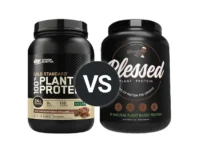Knowledge BaseYou're Questions Answered
BACK
What benefits do protein powders provide athletes?
Protein powder is a popular dietary supplement among athletes, and for good reason. It offers a range of benefits that can enhance athletic performance and support recovery after exercise. Here are some of the key benefits of protein powder for athletes:
- Muscle growth and repair: Protein is essential for building and repairing muscle tissue, and adequate protein intake is crucial for athletes who want to maximize their muscle growth and recovery. Protein powder provides a convenient and effective way to increase protein intake, which can support muscle growth and repair.
- Improved athletic performance: Protein is also important for improving athletic performance. It can help increase muscle strength, power, and endurance, which can improve overall athletic performance. In particular, research has shown that protein supplementation can enhance muscle strength and power when combined with resistance training.
- Reduced muscle soreness and fatigue: Protein supplementation may also reduce muscle soreness and fatigue after exercise. One study published in the Journal of the International Society of Sports Nutrition found that whey protein supplementation reduced muscle soreness and improved recovery following high-intensity resistance training.
- Weight management: Protein can also support weight management, as it can help increase feelings of fullness and reduce appetite. This can be particularly beneficial for athletes who need to maintain a specific weight or body composition for their sport.
- Convenience: Protein powder is a convenient and easy way to increase protein intake, especially for athletes who have busy schedules or limited access to whole food sources of protein.
Overall, protein powder can be a valuable supplement for athletes who want to maximize their muscle growth and recovery, improve their athletic performance, and support their weight management goals.
Was this answer helpful? Let us know!
Like
References:
- Cermak NM, Res PT, de Groot LC, Saris WH, van Loon LJ. Protein supplementation augments the adaptive response of skeletal muscle to resistance-type exercise training: a meta-analysis. Am J Clin Nutr. 2012;96(6):1454-1464. doi:10.3945/ajcn.112.037556
- Hulmi JJ, Lockwood CM, Stout JR. Effect of protein/essential amino acids and resistance training on skeletal muscle hypertrophy: A case for whey protein. Nutr Metab (Lond). 2010;7:51. doi:10.1186/1743-7075-7-51
- Pasiakos SM, McLellan TM, Lieberman HR. The effects of protein supplements on muscle mass, strength, and aerobic and anaerobic power in healthy adults: a systematic review. Sports Med. 2015;45(1):111-131. doi:10.1007/s40279-014-0242-2
- Cooke MB, Rybalka E, Stathis CG, Cribb PJ, Hayes A. Whey protein isolate attenuates strength decline after eccentrically-induced muscle damage in healthy individuals. J Int Soc Sports Nutr. 2010;7:30. doi:10.1186/1550-2783-7-30
- Leidy HJ, Clifton PM, Astrup A, et al. The role of protein in weight loss and maintenance. Am J Clin Nutr. 2015;101(6):1320S-1329S. doi:10.3945/ajcn.114.084038
Add to this Answer
Related Questions
Related Reviews

Disclosure
Your Answer
Do you have a suggestion to improve the answer? Please detail your suggestions and provide any references to information that may support your answer if available.
The content on this site has not been written, reviewed or endorsed by a medical professional. We assume no liability for the misuse of supplements and recommend you review the label of any product, as well as consulting with your health care professional.
We are a participant in the Amazon Services LLC Associates Program, an affiliate advertising program designed to provide a means for us to earn fees by linking to Amazon.com and affiliated sites.
We are a participant in the Amazon Services LLC Associates Program, an affiliate advertising program designed to provide a means for us to earn fees by linking to Amazon.com and affiliated sites.
© 2026 ProteinPowder.com



